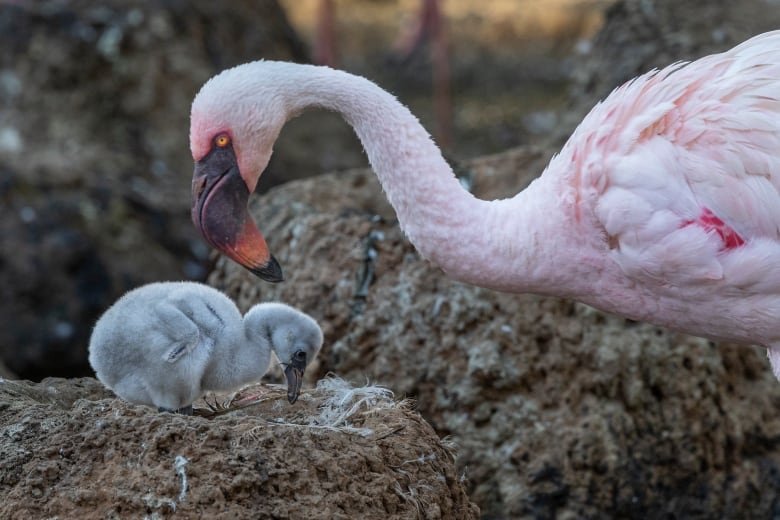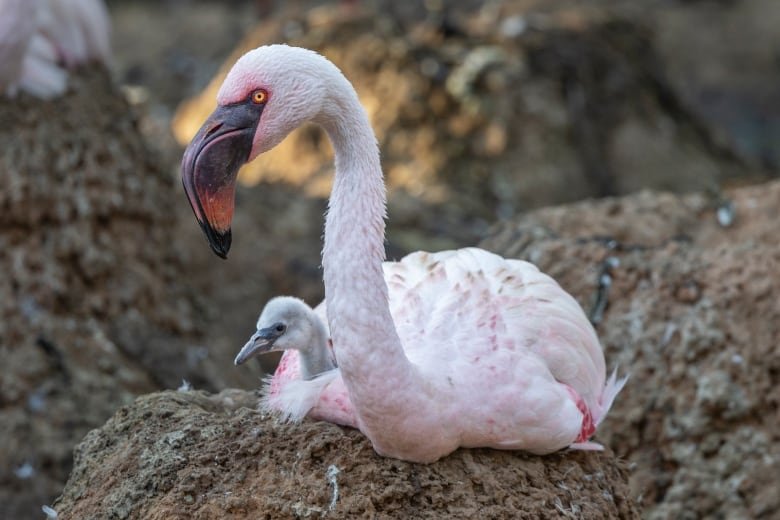It was pretty obvious that two male flamingos at the San Diego Zoo Safari Park wanted to start a family together, say staff.
The duo, neither of whom had ever raised a chick in their 40 or so years at the zoo, recently started acting as if they were incubating an egg together, taking turns sitting on an empty nest.
But they are empty-nesters, no longer. The pair is now raising a healthy and growing baby bird, after staff gave them an egg of their very own to hatch.
“We just were kind of surprised to see that these two boys acting like they wanted to have a nest together. And we kind of went from there,” Eric Lutomski, the zoo’s senior wildlife care specialist, told As It Happens host Nil Köksal.
“Both parents are doing a great job.”
They raised a fake egg first
It’s not unheard of for pairs of same-sex flamingos to hatch and raise eggs. In fact, Lutomski says, some zoos have reported that eggless male pairs will even go so far as to steal an egg from another bird’s nest.
Not wanting to risk an egg-napping, zoo staff instead decided to let their would-be parents become foster dads.
But first, Lutomski says, they gave the birds, both members of the lesser flamingo species, a fake egg in July to see what would happen. This, he says, is necessary because, in the past, some flamingos have rejected eggs that weren’t theirs, or even acted aggressively toward them.

Not so for these boys.
“Once we did give them the fake egg you could, like, see it right away. They ran over to the nest. They started talking back and forth with each other. One of them got on the nest right away and sat on it and started keeping it warm,” Lutomski said.
So staff swapped the fake egg for a real one, which hatched last month. Now they are proud papas to a baby flamingo, also known as a flaminglet.
“They’re pretty cute and floppy, like a little cotton ball out there,” Lutomski said.
Same-sex behaviour not uncommon
Male birds raising chicks together is not unheard of.
Curtis and Arthur, male flamingos in a U.K. zoo, hatched an egg in August. Male penguins Elmer and Lima did the same at a New York zoo in 2022. Male vultures hatched and raised an abandoned egg at a zoo in Amsterdam in 2017.
It happens in the wild, too. In 2019, As It Happens reported on a trio of bald eagles, one female and two male, raising eaglets together in the wilderness of Illinois.
Anthropologist Karyn Anderson, a PhD student at the University of Toronto, says same-sex parenting has been observed in all sorts of animal species, including birds and mammals.
There are a few theories as to why it occurs, she said. It might strengthen social bonds and facilitate resource sharing. Or it might increase the likelihood of survival for eggs and chicks that otherwise may have been abandoned.
It can also contribute to a species’ reproductive success by allowing them to hatch more eggs than they could conceivably raise on their own.

Anderson co-authored a study earlier this year that found same-sex behaviour is a lot more common in the animal kingdom than previously believed, and that it often goes unreported.
And same-sex behaviour, she says, does not always mean sex.
“A lot of recent work has been really emphasizing the importance of including things in the definition of same-sex sexual behaviour beyond just genital contact — things like raising offspring together, courtship, and pair-bonding,” Anderson said.
Blood-red ‘milk’
Lutomski says it’s not clear whether the zoo’s daddy duo are “a couple,” but they are certainly pair-bonded, at least for this breeding season.
And they’re working diligently to look after their baby, who does not yet have a name and whose sex won’t be known until it gets older.
They’re even able to feed their little fuzzball without assistance, he said. Both male and female flamingos can produce a blood-red, nutrient-rich substance called “crop milk,” regurgitating it from an organ in their digestive tract directly into their little one’s hungry mouth.
The process literally drains the colour out of the parents, he says, turning bright pink flamingos temporarily pale or white.
But it helps their flamiglets grow, and, so far, it’s working great.
“This one’s about a foot tall right now,” he said. “He’s growing nice and strong.”

